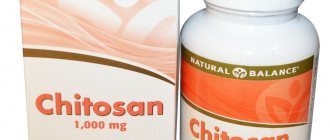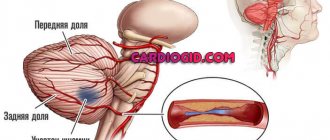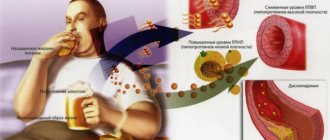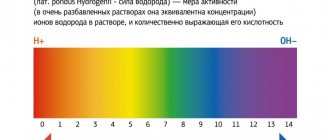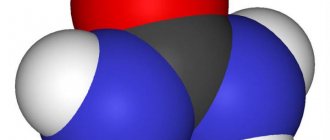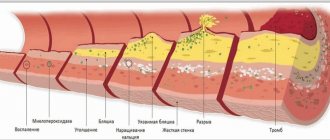Today, there are a huge number of coffee lovers, many of whom simply cannot imagine a day without this invigorating hot drink. However, in addition to the benefits and excellent taste, coffee has a rather negative effect.
Scientists have been studying the effects of coffee on the body and, in particular, on blood cholesterol levels for several centuries.
We have collected and analyzed a lot of relevant information about scientific research and medical practice, so this article is intended to determine as clearly as possible what effect the consumption of coffee beans has on cholesterol and in what doses it is still allowed to drink coffee with elevated blood cholesterol levels.
Composition of the product and its effect on the body
Despite the simplicity of the drink and its low calorie content (about 9 Kcal in one cup), the coffee beans themselves are not as simple as they might seem at first glance, but have an extremely complex and varied composition.
Safe dose of coffee.
Caffeine , the same main component found not only in coffee but also in tea, is extracted industrially for further use in energy drinks.
Caffeine affects the central nervous system, increasing its activity, as a result of which mental and physical performance increases, drowsiness disappears, and dopamine (the hormone that causes a feeling of pleasure) is released.
In addition, new studies using high-tech equipment have shown that caffeine reduces platelet aggregation, that is, it reduces the risk of small particles sticking together, which subsequently form blood clots.
However, there is also a negative side to this effect, since caffeine increases heart function and increases blood pressure. This is why doctors do not recommend drinking coffee if you have atherosclerosis, hypertension and other diseases of the cardiovascular system.
Nicotinic acid (vitamin B3) is a vitamin involved in many metabolic reactions, including lipid metabolism. One cup of natural bean coffee (100 ml espresso) contains from 1.00 to 1.67 mg of nicotinic acid.
It is known that when taking more than 3-4 mg of nicotinic acid per day, the level of LDL cholesterol in a person’s blood significantly decreases, and the level of HDL (the so-called “good cholesterol”) increases.
Nicotinic acid contains vitamin PP - one of the main vitamins that determine the processes of conversion of energy, fat and sugar. In addition, it strengthens small capillaries, normalizes the structure and elasticity of blood vessels, and improves blood circulation.
Nicotinic acid also dilates small blood vessels, improving the circulation of substances in them, and increases the fibrinolytic activity of the blood. Due to such a wide range of pharmacological properties, nicotinic acid is actively used in the treatment of atherosclerosis and some other vascular diseases.
However, this does not mean at all that if you have high cholesterol levels, it is enough to drink several cups of coffee a day, which provide a “medicinal” dose of nicotinic acid. Don’t forget about the high content of the previous component in coffee beans – caffeine.
Cafestol is a molecule found in unfiltered Arabica beans (it is found in extremely small quantities in filtered drinks). As a rule, cafestol is formed mostly during cooking. Its structure is similar to resin, it is insoluble in water, and when it enters the body, it disrupts lipid metabolism, changes the activity of liver cells, as well as the synthesis of bile acids.
In addition to these three components that are most interesting to us, coffee beans also contain:
The effect of an excessive dose of caffeine on the body.
nitrogenous substances;- fats;
- proteins;
- carbohydrates;
- essential oils;
- sugar;
- vitamin B6.
The content of all the substances described above depends on the type of coffee beans, as well as on the roasting method and the subtleties of preparation. However, their effect on the body with an adequate daily dose of the drink remains minimal; caffeine, cafestol and nicotinic acid have the greatest impact.
Is all cholesterol the same?
Cholesterol is found in the blood, but does not dissolve in it. Cholesterol is carried throughout the body by lipoproteins. High density lipoprotein (HDL) molecules
move cholesterol from the arteries to the liver. Later, this cholesterol is excreted from the body and is not deposited on the walls of blood vessels. Such cholesterol is considered “good” because it not only does not increase, but reduces the risk of developing cardiovascular diseases.
Another type of cholesterol carried by low-density lipoprotein (LDL) molecules
from the liver throughout the body. In peripheral tissues, cholesterol gradually settles on the walls of blood vessels, resulting in the formation of atherosclerotic plaques. It is important for a person to monitor and prevent an increase in the level of low-density lipoproteins, or “bad” cholesterol.
Another form of lipids that provide the body with energy, but in large quantities can be harmful, are triglycerides. They are synthesized by the liver or enter the body with food, and then pass into the blood. A high content of triglycerides in the blood is also undesirable, since it can disrupt the functioning of the circulatory system.
Does coffee raise cholesterol?
On the one hand, if we consider the drink from the point of view of its chemical composition, then the answer to the question of whether coffee increases cholesterol is clear, since coffee does not contain any vegetable fats or cholesterol.
However, it is much more objective to consider a product from the point of view of the impact of its components on the body. Almost any coffee, especially unfiltered coffee made from Arabica varieties, contains cafestol, which directly increases cholesterol levels by an average of 8-9% after just a few weeks of regular consumption of the drink.
Undoubtedly, for a healthy person with normal blood cholesterol levels, this does not pose any health threat. However, for a person with impaired lipid metabolism and a high risk of developing atherosclerosis, such changes can be critical.
When it enters the stomach, cafestol irritates the receptors of its epithelium, as a result of which, after a complex biochemical reaction, increased production of cholesterol by liver cells is stimulated. In addition, cafestol can accumulate in the human body and have even more harmful effects over time. So, with its regular use, after a year, cholesterol levels can increase by 12-20%, and if its level is already quite high, an additional increase in concentration by 20% will be simply critical.
Decaffeinated coffee
In principle, it is possible, since caffeine does not participate in the process of cholesterol synthesis. It is cafestol that matters, and natural decaffeinated coffee contains it, like other natural oils. That is, if you prefer ground coffee without caffeine, the principles of safe consumption with high cholesterol are the same as for regular natural coffee - the finished drink must be filtered through a filter. If you drink decaffeinated instant coffee, if you have high cholesterol, it will not increase its blood level.
So is it possible to drink coffee if you have high cholesterol?
In general, due to the cafestol content, doctors do not recommend drinking coffee if you have high cholesterol. However, with a competent approach, which involves preparing a drink with minimal cafestol formation, you can still treat yourself to a cup of aromatic drink. There are two methods of circumventing the ban, in which the influence of cafestol is absolutely safe:
After brewing coffee, it must be passed through a fine filter, such as a disposable paper filter. This way, all insoluble components, including cafestol, will remain on the filter. When preparing coffee in a coffee machine, you must pay attention to the presence of a filter in it; if there is none, you can pass the drink through the same paper filter after preparing it in the coffee machine.- Since more than 95% of cafestol is formed during brewing, it is possible to drink instant coffee that does not undergo this process. However, in this case, everything depends on the quality of the product, because cheap instant coffee intended for wide consumption does not always comply with safe processing and packaging technology.
But even with such methods, it is not recommended to abuse the drink and drink more than two cups per day. In addition, do not forget about the high caffeine content, which creates additional stress on the heart and increases blood pressure, which is highly undesirable if you have high cholesterol.
There is a myth that adding milk to coffee neutralizes cafestol and subsequently this composition has absolutely no effect on the concentration of cholesterol in the blood.
In fact, this is not true and milk has no effect on cafestol. In addition, adding milk with a fat content of more than 2% makes coffee even more dangerous, since milk contains a lot of animal fats, which are simply unacceptable for people suffering from hypercholesterolemia.
Conclusion: natural bean coffee, considered classic, is simply prohibited if you have high cholesterol, because, despite many positive qualities and a high content of vitamins, it contains caffeine and cafestol. If for a healthy person they do not have a significant effect, then for a person with high cholesterol levels they will only aggravate the situation. The only exception is filtering the drink through a paper filter.
The way out of the situation is instant coffee, which does not go through the brewing process and dissolves in ordinary warm water. However, even in this case, it is necessary to monitor the strength of the drink and how many cups of coffee you drink during the day.
How does coffee affect blood cholesterol?
The effect of coffee on cholesterol is due to the cafestol it contains, an organic compound that increases cholesterol levels in the human body. Cafestol is present in coffee oils and is formed in coffee during the brewing process. Cafestol, and therefore coffee, affects cholesterol by up to 6 to 8 percent if you drink it in large quantities every day. The effect of the substance has been well studied: it affects the receptors of the small intestine, disrupting the processes that control cholesterol levels in the blood.
In other words, coffee increases cholesterol, but only increases it if it contains a noticeable amount of cafestol. The latter is formed only during cooking, and the longer you cook, the more it is formed. Instant coffee will be safe for high cholesterol - it does not increase the initial level of cholesterol and does not disrupt the mechanisms for controlling its concentration.
Is it possible to drink coffee if you have high cholesterol?
Yes, if you have high cholesterol, you can drink coffee, but only instant coffee, which has virtually no effect on cholesterol levels (the story is somewhat similar to eggs for high cholesterol). However, instant coffee contains substances that irritate the gastric mucosa. Therefore, it is not recommended for people with diseases of the stomach, liver or pancreas.
Is it possible to have coffee for atherosclerosis?
Boiled and unfiltered coffee is not recommended for atherosclerosis and hypercholesteremia, because contains oils that can increase total cholesterol (TC) levels of low-density lipoproteins (LDL). Filtration removes oils, so most brands of coffee can be drunk if you have atherosclerosis.
Is coffee bad for high cholesterol?
Yes, if we are talking about an insoluble drink, it can raise cholesterol levels by 6 - 8%. Instant coffee and cholesterol are not related in any way, and therefore there is no need to talk about harm, but only if the cause of high cholesterol is not a violation of the liver. Some studies suggest a decrease in the elasticity of the walls of blood vessels with excessive coffee consumption, but others indicate the opposite: two cups a day, on the contrary, increase the elasticity of blood vessels.
Does coffee increase blood cholesterol?
Instant coffee does not increase blood cholesterol levels, it is not harmful to the body and blood vessels. Insoluble, subjected to cooking, increases. Please note: the presence of caffeine does not affect your cholesterol levels in any way - regardless of whether you drink coffee with caffeine or decaffeinated, it does not affect anything in this situation.
How much cholesterol is in coffee?
Coffee contains no cholesterol at all. The connection between coffee and cholesterol is monitored only at the cafestol level or is of a purely mediocre nature: if you drink coffee with milk or cream, and eat fatty foods along the way, then the connection will be obvious, but the coffee itself will have nothing to do with it.
Is it possible to drink coffee with milk if you have high cholesterol?
Cholesterol is found in milk and cream (if you drink 3-in-1 coffee or something similar). 1% fat milk contains approximately 5 mg of cholesterol per 100 ml; milk powder, often used instead of regular milk when making coffee, contains 97 mg per 100 grams of product. Therefore, coffee with milk leads to an increase in blood cholesterol, albeit slightly.
Why does coffee raise cholesterol?
The whole point, as mentioned above, is in cafestol, which is formed when brewing natural coffee. You can rid the drink of it by filtering the brewed coffee through a paper filter, which we will discuss below. Cafestol affects specific stomach receptors that respond to the content of bile acids. The substance inhibits the fibroblast growth factor gene, which suppresses the liver’s activity in the synthesis of bile acids, which cleanse the blood of cholesterol.
The mechanism of action of cafestol is most easily explained as follows: it stimulates a greater number of receptors in the stomach, which are responsible for the absorption of nutrients (nutrients) along with cholesterol. Those. coffee is doubly dangerous with fatty and cholesterol-rich foods (for example, your morning bacon and eggs).
In addition, people who are genetically predisposed to metabolize caffeine slowly have a slightly higher risk of heart attack. However, this risk is still negligible to be taken seriously, and besides, it occurs only in patients with advanced atherosclerosis and cardiac ischemia, when it’s time to think about how to remove cholesterol plaques.
Can you drink coffee if you have high cholesterol?
New research on the relationship between coffee consumption and cholesterol levels suggests that you can drink coffee in limited quantities and prefer instant drinks or filter drinks from brewed coffee.
But green coffee is even recommended for hypercholesterolemia (it is even recommended as a means of dissolving cholesterol plaques in blood vessels), as a supplier of chlorogenic acid, which normalizes the content of lipoproteins in the blood. Recent research has also disproved the theory that cafestol is formed from caffeine, so there is little point in using decaffeinated coffee.
When and why should you not drink coffee if you have high cholesterol?
When there are disturbances in the functioning of the pancreas, gastrointestinal tract and (or) liver, because any coffee irritates the mucous membrane of the intestines and stomach. Insoluble natural coffee, if it is not possible to filter it, should also not be drunk, because it can and will increase cholesterol, although drinking coffee can hardly be called the main cause of high cholesterol in men and women.
Natural coffee and cholesterol
Ground black, natural coffee and cholesterol, as well as coffee with milk (or cream), coffee in the morning after scrambled eggs and bacon (or any other fatty food) pose an increased risk for hypercholesterolemia. Natural coffee together with fatty foods, when taken regularly, can raise the level of low-density lipoprotein (“bad” cholesterol) not by 6–8%, but by 20–30%!
What coffee increases cholesterol?
Natural (brewed, boiled), black ground coffee, unless strained through a paper filter. It doesn't matter whether the coffee is decaffeinated or decaffeinated - it does not increase cholesterol levels. Instant coffee apparently has no effect on TC, but also does not help cleanse the blood of cholesterol.
Does coffee lower cholesterol?
Coffee is credited with many beneficial properties, such as protecting blood vessels from free radicals and reducing the negative effects of high sugar levels and diabetes. But only green coffee can potentially reduce blood cholesterol. A consistent reduction in cholesterol from coffee, however, is unlikely. Rather, we are talking about a slight reduction or assistance in reducing LDL cholesterol by complementing the action of other factors.
Does coffee remove cholesterol from the body?
No, in general, coffee does not affect cholesterol levels either more or less. Coffee definitely does not remove cholesterol from the body. Products for cholesterol plaques are suitable for this.
Coffee with chocolate and cholesterol
There is no double damage from drinking coffee and chocolate together. Dark chocolate increases cholesterol levels - this is true, but it is also true that this increase occurs due to less dangerous fractions of LDL and generally beneficial HDL (which allows you to achieve increased levels of healthy cholesterol).
Is it possible to drink coffee before donating blood for cholesterol?
It is not advisable to drink natural, black ground coffee and coffee with milk, as well as green coffee (which lowers blood cholesterol levels), although it is unlikely that its effect will seriously affect the test results. Especially if you stick to a diet with high blood sugar and cholesterol.
Modern decaffeinated drink
Another safest loophole for drink connoisseurs is decaffeinated coffee, invented in 1903. As coffee beans are processed, decaffeination is carried out - the process of removing caffeine through steam, boiling water, saline and many other methods. In any case, up to 99% of caffeine can be removed from the beans.
Decaffeinated coffee has the following benefits:
- No effect on blood pressure and even vice versa - such a drink lowers it;
- Lack of effect of stimulating the heart in increased activity mode;
- This drink does not affect sleep at all, so you can safely drink it even in the evening.
The negative side of this treatment is the complete loss of the stimulating and energetic properties that make many people so fond of drinking coffee in the morning. In such a drink, only the taste characteristics remain, but vitamins remain, as well as nicotinic acid, which has a positive effect on lipid metabolism.
Do healthy people need to monitor their cholesterol?
Often people begin to monitor certain indicators when problems appear and their health worsens, but prevention is always better than cure. The concept of “healthy person” is too general. You may not have liver or metabolic problems now, but that doesn't mean you won't have them in the future. People with identified lipid metabolism disorders should regularly undergo cholesterol tests, but others should not check the strength of their body.
If your diet often contains fatty foods, high-calorie foods, and in general you like to indulge in sweets, then sooner or later this will increase your cholesterol. Other cardiovascular risk factors may also have an impact. As a result, you risk getting atherosclerosis with all the attendant consequences.
Cholesterol norm
If, according to the test results, your cholesterol is normal, then there is no serious cause for concern. Provided you follow the rules of a healthy diet and a healthy lifestyle, the next examination can be done in a few years.
If the cholesterol level is elevated ( from 5 to 6.4 mmol/l or more
), then it’s worth monitoring it every six months to observe the dynamics. At the same time, you need to reconsider your diet, remove foods that increase cholesterol, and also give up bad habits: smoking and drinking alcohol. Your doctor should warn you about additional risks associated with the presence of concomitant diseases.
over 6.4 mmol/l is considered a high-risk level.
. This indicator indicates the need for specialized treatment, since there is a high probability of developing coronary heart disease and other cardiovascular complications. The treatment program should be drawn up by a doctor based on the tests performed, including identifying the level of LDL, HDL and triglycerides.
Impact on lipid metabolism
Cholesterol is not included in the chemical composition of grains. This fact is puzzling, and the question of what connects coffee and cholesterol in the blood remains open. The reason for the negative impact lies in one of the components.
A substance called “cafestol” causes significant harm to the body, although there is very little of it in the grains. It becomes especially dangerous after preparing the drink.
According to the results of numerous studies, this compound, by irritating the intestinal walls, gives a false signal that the level of cholesterol is insufficient for normal life. The liver begins to actively produce lipids. As a result, their amount in the blood becomes higher than normal. Therefore, people diagnosed with atherosclerosis are prohibited from drinking excessive amounts of coffee.
There is a misconception that milk can neutralize the effect of cafestol. In fact, milk is another source of cholesterol because it enhances the synthesis of fatty alcohols in the liver.
Choosing a Safe Drink
When drinking natural coffee, cholesterol in a person’s blood increases, but this does not mean that you have to give up the drink. You can replace it with alternatives:
- Black coffee with filters. When coffee is brewed, cafestol is released during boiling, which provokes the production of cholesterol. To minimize the amount of the component, you should pass the drink through filters, then insoluble substances will remain outside.
- Instant. Despite the fact that the freeze-dried caffeine-containing product is more toxic than the natural product, it does not contain cafestol. Instant coffee does not go through the brewing stage, and natural oils are extracted from its composition.
- Cocoa is a unique drink that helps minimize the amount of cholesterol in the body and prevent its deposition on the walls of blood vessels.
- Green coffee. Coffee oils open up during the roasting process; green beans do not require such a stage, so cafestol is not released. The main element of this drink is chlorogenic acid, which stabilizes the balance of cholesterol in the bloodstream.
What kind of coffee you can drink if you have high cholesterol depends on personal taste preferences and the method of preparing the drink.
Black
Coffee beans do not contain pure cholesterol and there seems to be no reason to worry. But as already described above, the problem is that cafestol is released during boiling; when this element enters the body, it disrupts processes and provokes increased secretion of cholesterol.
To avoid this, it is recommended to purchase a coffee maker with a filter or use improvised means: a clean cloth or napkins. To prevent the harmful effects of the drink, you are allowed to drink no more than 2 cups of coffee per day.
Instant
Cafestol is completely absent from the instant caffeine-containing product: since preparing the drink does not require boiling, it easily dissolves in warm water. Thanks to this, we can conclude that its use does not cause an increase in cholesterol.
But we should not forget that such a drink contains flavor enhancers, preservatives, flavorings and other harmful components that can cause irritation of the gastric mucosa or problems in the functioning of the pancreas.
Cafein free
There is an opinion that for atherosclerosis, a caffeine-free drink will be more beneficial, but such reasoning is erroneous. During the processing of coffee beans, the component is removed from the drink, resulting in 99% of the organic compound being eliminated. However, in relation to cholesterol, the drink exhibits the same properties. To reduce the influence of cafestol, it is recommended to use filters.
Green
Green coffee does not require roasting of the coffee beans, so there is no release of cafestol. The main component of the drink is chlorogenic acid, thanks to which green coffee:
- Tones the central nervous system.
- Stimulates blood circulation.
- Speeds up metabolism.
- Removes toxins.
- Stabilizes cholesterol levels in the bloodstream.
Natural coffee does not contain pure cholesterol. An increase in cholesterol in the bloodstream causes cafestol, which is released during cooking of grains. Moreover, the longer the coffee is prepared, the higher the concentration of this component will be in it. To avoid the negative effects of the drink, it is recommended to use special filters. You can also replace black coffee with instant or green coffee, since they do not contain cafestol.
Importance for the body
Many people have the misconception that cholesterol is extremely dangerous and harmful to health. It comes in with food. And it is necessary to take all measures to avoid the accumulation of this substance in the body. The statements are half true.
Cholesterol is an organic, fatty compound that helps in metabolism and promotes the normal functioning of internal organs. About 20% of lipid compounds enter the body with food, the remaining 80% are produced independently. Synthesis occurs in the intestines and liver.
Functionality
The connection plays an important role in life:
- Participates in fat metabolism and promotes uniform distribution of lipids;
- Breaks down fat-soluble vitamins and transports them throughout the body;
- Produces structures from which the cell membrane is built, protecting against external influences. Cell permeability and vulnerability depend on its thickness. A sufficient amount of cholesterol helps strengthen the membrane, making it durable.
- Regulates cell permeability for the intake of nutrients and the excretion of synthesized compounds;
- It is part of the myelin sheaths, which serve as a protective layer of nerve fibers;
- Thanks to this organic compound, the sun's rays, namely ultraviolet radiation, are converted into vitamin D in the body;
- Helps in the formation of bile and promotes the correct elimination process;
- Plays an important role in the protection of red blood cells, protecting red blood cells from toxins, viruses, bacteria;
- The production of sex hormones, adrenaline and norepinephrine occurs with the participation of cholesterol;
- A good mood also depends on the amount of this substance in the body. It is involved in the work of serotonin receptors, responsible for their normal functioning;
- Ensures the performance of the entire body, starting from the cellular level and ending with muscle function and the strength of the bone skeleton;
- Thanks to its presence, the synthesis of hormones and the absorption of vitamins is possible. Correct metabolism occurs, metabolic rate is regulated;
In the fight against fat deposits, the presence of cholesterol has a beneficial effect. It promotes the formation of fatty acids and the breakdown of fats that enter the body with food.
Thus, cholesterol is an important component of our body. And what high cholesterol means for health is not difficult to answer.



